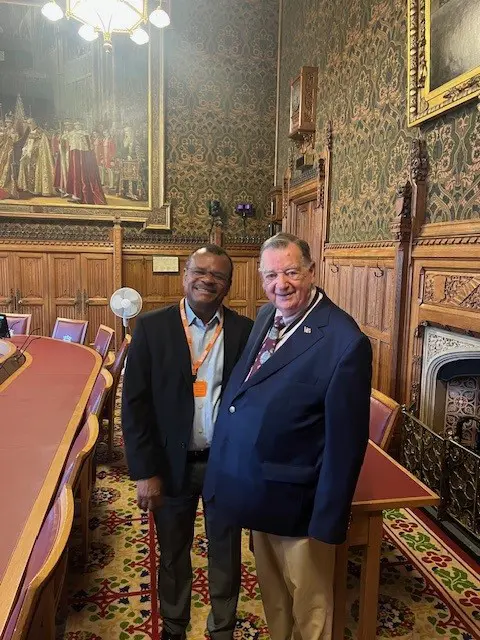Louis Herns Marcelin, a professor of anthropology at the University of Miami College of Arts and Sciences, has been awarded a prestigious visiting professorship in the United Kingdom.
Offered by the Leverhulme Trust of the British Academy, which is the United Kingdom's academy for the humanities and social sciences, the visiting professorship enables British universities to invite eminent professors from other countries to lead research collaborations in their areas of expertise.
Marcelin began his visiting professorship this summer at the University of Cambridge. He also worked with graduate students and faculty at the University of Liverpool and the University of Lancashire in England, as well as the University of Glasgow in Scotland. Additionally, he held a public conference on Haiti at the U.K. Parliament's House of Lords.
Through his visiting professorship, Marcelin is developing a multi-disciplinary research program focused on the impacts of slavery and plantation systems on contemporary violence in the Americas, with a particular emphasis on Haiti. He is mentoring doctoral students and post-doctoral fellows who are researching topics such as violence in post-slavery plantation societies, intergenerational trauma, and sociopolitical institutions rooted in slavery.

"While similar patterns are evident in post-plantation societies across the Americas—where the legacies of slavery manifest in concentrated wealth and land ownership by a small elite, persistent racialized poverty, increased policing of Black and Indigenous communities, and ongoing symbolic and physical violence—Haiti presents a unique case," Marcelin explained. "Despite the fact that Haitian freedom was built on dismantling the oppressive institutions originating from the slave plantation system, these legacies persist through systemic violence. This includes chronic sociocultural and political exclusion, educational neglect, lack of healthcare resources, and environmental decline."
Marcelin added that these forms of violence reproduce intergenerational trauma, weaken social cohesion, and create conditions for acute crises. "In Haiti, the rise of heavily armed gangs controlling entire neighborhoods is linked not only to political manipulation, but also to decades of state neglect, economic exclusion, and the collapse of rural livelihoods that have driven urban migration without adequate infrastructure," he said. "The legacies have many dimensions."
In addition to working with researchers in the United Kingdom, Marcelin is collaborating with colleagues at the University of Miami and professors at other universities in the United States, the Caribbean, and Ghana, as well as with the International Slavery Museum in Liverpool, England, and the Fitzwilliam Museum at the University of Cambridge, among other institutions.
During his 18-month visiting professorship, which ends in December 2026, Marcelin will travel between the University of Miami and the United Kingdom.
As part of his visiting professorship, he is organizing a workshop in June 2026 at the University of Cambridge with Charles Forsdick, a professor of French. The workshop will build on existing research at top institutions studying transatlantic slavery and its lasting effects.
"By bringing together scholars and curators, we want to connect historical and modern views, encouraging discussions that relate global research to the situation in Haiti," Marcelin said. The goals of the workshop, he added, include creating at least one shared research proposal and setting up a transatlantic research network focused on these issues.






